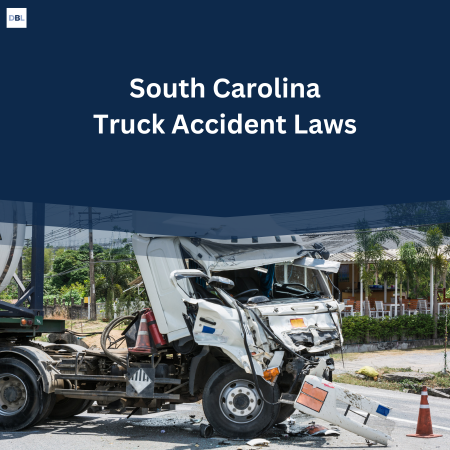
Truck accidents are far more dangerous than collisions with another passenger vehicle. The average passenger vehicle weighs around 4,300 pounds, while large trucks may weigh nearly 80,000 pounds. In a collision between a passenger vehicle and a big commercial truck, the passenger vehicle will suffer far more damage, and the people inside it will likely be hurt much worse.
If you’ve been injured by a large commercial motor vehicle, SC truck accident laws give you the right to pursue compensation for your losses. Violations of state and federal regulations can also be valuable evidence establishing what caused a collision. A personal injury lawyer can help you prove that the truck driver or another party was at fault for your injuries.
David Blackwell Law is a compassionate truck accident law firm that has been serving injured victims since 2003. We have the experience and knowledge of the South Carolina legal system to help you seek money covering all your medical expenses, lost income, and other losses from the collision. Contact David Blackwell Law today for a free consultation to learn more.
Truck Speed Limits in South Carolina
Was the truck that hit you going too fast according to South Carolina laws? Trucks in South Carolina must follow the same speed limits as passenger vehicles, unless signs say otherwise. Under state law, the maximum posted speed limits are:
- 70 mph on interstates and freeways
- 60 mph on multi-lane divided highways
- 55 mph on other roads
- 40 mph on unpaved roads
- 30 mph in urban areas
The law also requires motorists to drive at a reasonable speed for current conditions to avoid collisions. Drivers should slow down in bad weather, at intersections, around curves, up hills, on narrow roads or bridges, or when other hazards are present.
Exceeding the speed limit may be evidence of fault in a truck accident case. Your attorney can determine whether the truck was speeding when the crash occurred.
Truck Weight Limits in South Carolina
An overloaded commercial vehicle can also prove truck accident liability. The weight limits in South Carolina for all vehicles, including commercial trucks, are:
- Combination of vehicles:
- 73,280 pounds for five or more axles
- 65,000 pounds for four axles
- 50,000 pounds for three axles
- Single-unit vehicles:
- 65,000 pounds for five or more axles
- 63,500 pounds for four axles
- 46,000 pounds for three axles
- 35,000 pounds for two axles
The South Carolina Department of Transportation (SCDOT) can issue a permit for a load that exceeds the standard size and weight limits in certain cases.
All cargo must be properly loaded, secured, and balanced according to federal regulations. Otherwise, cargo could fall off the truck or cause the driver to lose control. Overloaded vehicles may also struggle to brake in time or cause failure of critical parts, like tire blowouts.
Rollover and jackknife accidents are more likely when trucks are too heavy. And when overloaded trucks crash into passenger vehicles, the results can be devastating – or even deadly.
Truck Accident Laws in South Carolina
In South Carolina, any driver involved in an accident resulting in damage, injuries, or death must:
- Stop the vehicle as close as possible to where the crash happened, but out of traffic if possible.
- Exchange information with the other driver, including name, address, and vehicle registration number, and show a driver’s license on request.
- Help anyone injured, including arranging transportation to the hospital if necessary.
Leaving the scene of a collision is a misdemeanor. It becomes a felony if someone is seriously injured or killed.
Drivers involved in a crash in which someone is hurt or killed must immediately report it to the police or the South Carolina Highway Patrol. If police do not respond to the accident scene, the driver must file a written report with the Department of Motor Vehicles (DMV) within 15 days.
After a truck accident in South Carolina, federal regulations require the trucking company to test the driver for drugs and alcohol in certain cases. The trucking company must also cooperate with officials in any accident investigation and keep records of every collision for at least three years.
South Carolina Regulations for Truckers
State and federal regulations outline rules that truckers must follow. These rules ensure that the driver and their truck stay in good condition, keeping everyone on the road safer.
Licensing
South Carolina requires truckers to have a commercial driver’s license (CDL) with a class appropriate for the type of truck. They may also need endorsements to operate certain types of trucks or transport various cargo types, such as hazardous materials.
Hours-of-Service Regulations
Federal hours-of-service regulations limit the number of hours that truckers can drive:
- Truck drivers are not allowed to drive longer than 11 hours after 10 consecutive hours off.
- The 10 hours off duty can be split if one is at least 2 hours and the other involves at least 7 hours in the sleeper berth.
- Truckers may not drive beyond the 14th hour after coming on duty.
- They must take a 30-minute break after every 8 hours on the road.
- They may not drive after 60 hours on duty in a 7-day period or after 70 hours on duty in an 8-day period until they have taken at least 34 hours off.
- If the driver is dealing with bad driving conditions, they can extend the maximum driving time by up to 2 hours.
Inspections
The Federal Motor Carrier Safety Administration (FMCSA) requires truck drivers to inspect their vehicles daily, both before and after driving, to ensure the truck operates safely. If there is anything wrong with their truck, it must be reported and fixed before they can drive it again.
Loading
Trucks in South Carolina must be loaded and secured so that cargo will not drop or leak. The cargo must also be properly balanced and not over the weight limits. Even if the driver doesn’t load the truck themselves, they are still responsible for inspecting the cargo and ensuring it is loaded correctly.
Violations of trucking regulations can be evidence of fault in a truck accident case. An experienced lawyer will know how to use South Carolina trucking accident laws to prove the at-fault party’s liability.
Compensation Laws for Trucking Accidents
After a trucking accident in South Carolina, the person who caused the crash is liable for any losses.
Comparative Negligence
If both parties were negligent, the court will compare the fault of both parties and assign a percentage to each. You can collect compensation as long as you are less than 51 percent at fault for the accident. However, the court will reduce your financial recovery by your percentage of responsibility for the collision.
Liability
If the driver violated any trucking regulations, including speed limits, hours-of-service limits, inspection requirements, or weight limits, it can be evidence that the driver was at fault for the accident. However, the truck driver may not be the only liable party. Other potential responsible parties include:
- The trucking company can have employer liability for the actions of its driver. It may also be directly negligent for its hiring, training, vehicle maintenance, and inspection policies or for pressuring the trucker to drive without enough sleep.
- The maintenance company may be responsible for not keeping the truck in safe working order.
- A manufacturer may be held liable for a defective truck part that caused the crash.
- Cargo loaders could be at fault for a load that is unbalanced, unsecured, or overweight.
Your trucking accident lawyer can determine all the potentially liable parties for you.
Truck Accident Compensation
When you file your personal injury claim, you can pursue compensation for:
- Medical expenses such as hospital bills, medications, physical therapy, long-term nursing care, and out-of-pocket expenses
- Lost income, including wages, commissions, raises, or promotions your injury prevents you from seeking
- Any loss to your lifelong earning capacity
- Pain and suffering caused by your injuries
- Emotional distress
- Loss of quality of life
Statute of Limitations for Truck Accident Claims
Under the South Carolina statute of limitations, you have three years from the accident date to file a personal injury lawsuit. Don’t wait too long before contacting an attorney. It takes time to investigate the details of the collision and conduct negotiations. Plus, the insurance carrier may try to delay the process to run out the clock.
Call Our South Carolina Truck Accident Attorney for Help with Your Case
A skilled truck accident attorney can help you hold the person who hurt you accountable. David Blackwell Law has been serving truck accident victims in the local community for over 20 years.
We take pride in the outcomes we’ve achieved for our clients. In one accident between a 16-year-old driver, an ambulance, and a tractor-trailer, we proved that the young driver was not at fault. We also secured $1.5 million in one tractor-trailer collision and $1.25 million in another.
Our team values the positive reviews we have received from our clients, such as John Coy, who says:
“Getting into an accident is always an unfortunate event but having a great team like this on your side will make a huge difference. I could have never received what I did alone.” – John Coy
We want everyone we help to say, “They made our lives better.” Contact David Blackwell Law today if you were injured in a truck accident in South Carolina.
